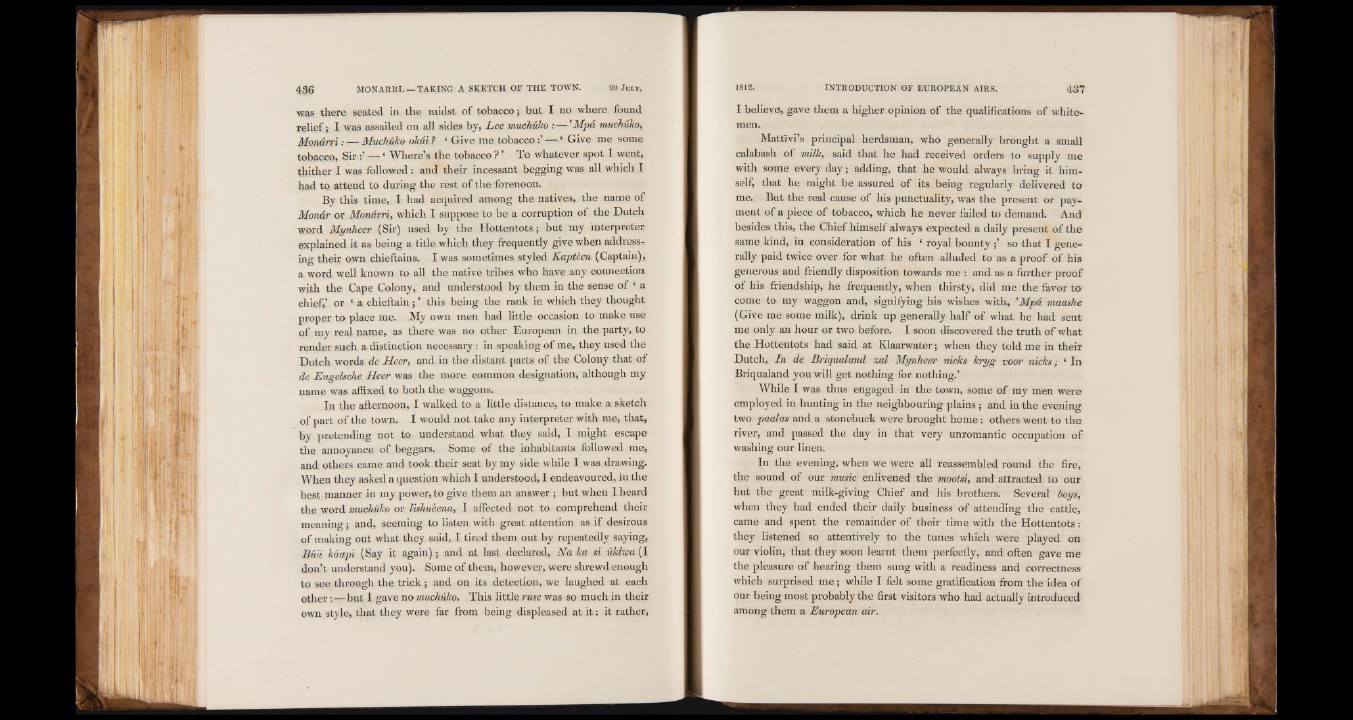
was there seated in the midst of tobacco; but I no where found
relief; I was assailed on all sides by, Lee muchuko:— 'Mpa muchuko,
Monarri Muchuko okai ? ‘ Give me tobaccoHs*i ‘ Give me some
tobacco, Sir rtv ‘ Where’s the tobacco ? ’ To whatever spot I went,
thither I was followed : and their incessant begging was all which I
had to attend to during the rest of the forenoon.
By this time, I had acquired among the natives, the name of
Mondr or Monarri, which I suppose to be a corruption of the Dutch
word Mynheer (Sir) used by the Hottentots; but my interpreter
explained it as being a title which they frequently give when addressing
their own chieftains. I was sometimes styled KapUen (Captain),
a word well known to all the native tribes who have any connection
with the Cape Colony, and understood by them in the sense of ‘ a
chief,’ or ‘ a chieftain; ’ this being the rank in which they thought
proper to place me. My own men had little occasion to make use
of my real name, as there was no other European in the party, to
render such a distinction necessary : in speaking of me, they used the
Dutch words de Heer, and in the distant parts of the Colony that of
de Engelsche Heer was the more common designation, although my
name was affixed to both the waggons.
In the afternoon, I walked to a little distance, to make a sketch
of part of the town. I would not take any interpreter with me, that,
by pretending not to understand what they said, I might escape
the annoyance, of beggars. Some of the inhabitants followed me,
and others came and took their seat by my side while I was drawing.
When they asked a question which I understood, I endeavoured, in the
best manner in my power, to give them an answer ; but when I heard
the word muchuko or lishueena, I affected not to comprehend their
meaning; and, seeming to listen with great attention as if desirous
of making out what they said, I tired them out by repeatedly saying,
Bud kaapi (Say it again); and at last declared, Ha ka si uklwa (I
don’t understand you). Some of them, however, were shrewd enough
to see through the trick; and on its detection, we laughed at each
other:— but I gave no muchuko. This little ruse was so much in their
own style, that they were far from being displeased at it: it rather,
I believe, gave them a higher opinion of the qualifications of white-
men.
Mattivi’s principal herdsman, who generally brought a small
calabash of milk, said that he had received orders to supply me
with some every day; adding, that he would always bring it himself,
that he might be assured of its being regularly delivered to
me. But the real cause of his punctuality, was the present or payment
of a piece of tobacco, which he never failed to demand. And
besides this, the Chief himself always expected a daily present of the
same kind, in consideration of his | royal bounty ;’ so that I generally
paid twice over for what he often alluded to as a proof of his
generous and friendly disposition towards me : and as a further proof
of his friendship, he frequently, when thirsty, did me the favor to
come to my waggon and, signifying his wishes with, ’Mpa maashe
(Give me some milk), drink up generally half of what he had sent
me only an hour or two before. I soon discovered the truth of what
the Hottentots had said at Klaarwater; when they told me in their
Dutch, In de Briqualand zal Mynheer nicks kryg voor nicks; ‘ In
Briqualand you will get nothing for nothing.’
While I was thus engaged in the town, some of my men were
employed in hunting in the neighbouring plains; and in the evening
two paalas and a stonebuck were brought home: others went to the
river, and passed the day in that very unromantic occupation of
washing our linen.
In the evening, when we were all reassembled round the fire,
the sound of our music enlivened the mootsi, and attracted to our
hut the great milk-giving Chief and his brothers. Several boys,
when they had ended their daily business of attending the cattle,
came and spent the remainder of their time with the Hottentots:
they listened so attentively to the tunes which were played on
our violin, that they soon learnt them perfectly, and often gave me
the pleasure of hearing them sung with a readiness and correctness
which surprised m e; while I felt some gratification from the idea of
our being most probably the first visitors who had actually introduced
among them a European air.